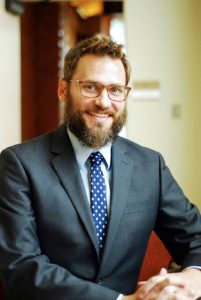
Photo courtesy: UM Digital Imaging Services.
Philosophy professor Timothy Yenter has been named the associate dean of the Sally McDonnell Barksdale Honors College. Previously, he served as interim associate dean.
Yenter said he is excited about new opportunities to work with students and faculty.
“I’m excited to be a part of a really strong team. I have a really great set of colleagues and staff who are really invested in unlocking the teaching potential and the research potential of undergraduate students working with faculty advisors. So it’s been a really great opportunity to get to know the university in a deeper way and find those opportunities to set students free,” Yenter said.
Yenter oversees capstone projects in the honors college, which are completed during a student’s junior or senior year. These projects differ from student to student depending on their majors. Whether they be creative projects or community-transforming projects, students often dedicate a year of work.
“We work with students to find things that help them achieve things that go beyond what they could otherwise do,” Yenter said. “So I will help them find advisors, give them financial support, do the other things that they can to take what they’ve been learning and get an individualized experience that not only culminates what they were doing as an undergraduate, but also sets them up. When you do a capstone, you are preparing for that first job or doing the work that’s going to make you stand out in a law school application.”
Yenter is a Wisconsin native and first-generation student. He attended Bethel University of Minnesota and completed graduate work at Yale University. Yenter also spent a semester abroad studying at the University of Oxford.
Yenter has taught philosophy at the University of Mississippi since 2012, and his interest in the capstone program began when he started teaching freshman seminar classes Honors 101 and 102.
Yenter now helps oversee the process for transfer students that recognize the value of this program to gain admission to the honors college.
“The experience that students can get through our honors college can be as rewarding, or more so, than you would get at the so-called elite universities, where you might never see your professors. Here, we really prize people who can both research and teach, and you can get that supportive learning environment through the honors college,” Yenter said.
Yenter sees the capstone project as an opportunity for students to grow beyond a normal college experience and set themselves up for their budding careers.
“I see the capstone process as an opportunity for students to achieve things that they didn’t know they could achieve,” Yenter said. “And when you do that, as part of the undergraduate experience, it sets you up for life afterwards. Because it’s not just other people’s expectations, it’s not just external standards, but something that you’ve learned how to do for yourself.”



























